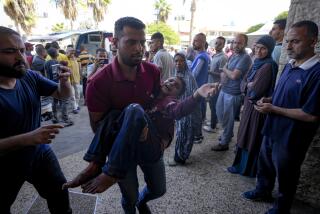Blast Levels Argentine Jewish Center, Kills 26 : South America: President Menem says attack was planned ‘from abroad.’ Area in Buenos Aires devastated.
- Share via
BUENOS AIRES — A huge explosion, probably a terrorist bomb, destroyed a seven-story downtown building housing two Jewish groups here Monday. At least 26 people were killed and 127 were injured.
Rescue workers feared they would find more bodies in the rubble of the building, where about 100 people worked.
The blast, which occurred shortly before 10 a.m., flattened cars and hurled deadly shards of glass and concrete along busy Pasteur Street. Parts of adjacent buildings also were destroyed, and others nearby were severely damaged. Many of the injured were passersby.
Argentine President Carlos Saul Menem, who said the attack was planned “from abroad and helped by people here,” called the perpetrators “beasts, savages.”
The explosion coincided with the start of peace talks between Israel and Jordan. Jewish community sources said the government has told them that they believe the explosion was the work of a Muslim fundamentalist group that came into the country from abroad.
Secretary of State Warren Christopher, visiting Israel, said the attack was “a reminder that despite the glowing prospects there are still the enemies of peace around the world, not only here in the Middle East.”
Two years ago, at least 29 people were killed, and more than 200 injured, in a bomb attack on the Israeli Embassy here. Police have not established responsibility for that explosion.
The building that was reduced to rubble Monday housed the Argentine Israelite Mutual Assn. and the Delegation of Argentine Israelite Assns., two of the most important Jewish organizations. About 250,000 Jews live in Argentina, most in Buenos Aires.
Israeli Prime Minister Yitzhak Rabin called the attack “a cowardly, criminal and evil act,” vowing that “Israel will continue to chase the perpetrators of terrorism to the end.”
A Palestine Liberation Organization official in Argentina denounced the blast.
“We deeply lament this attack against peace,” said Sujail Aquel, who represents the PLO in Buenos Aires.
A group calling itself Islamic Command telephoned a local radio station to take responsibility for the attack, but officials said nothing was known about such a group and that the call could have been a hoax.
Menem ordered the borders closed, and said two people were detained--an Iraqi carrying an expired Brazilian passport at the border with Brazil and an Iranian detained elsewhere. The president gave no details.
Earlier, a German woman and Iranian man were detained for questioning at Ezeiza International Airport outside Buenos Aires but were later released.
In the first hours after the explosion, Pasteur Street was crowded with rescue workers, volunteers, onlookers and people seeking news about relatives and friends.
A child and a young man were brought out of the ruins alive more than eight hours after the blast.
A crowd also gathered outside the nearby Clinicas Hospital, where most of the victims were taken.
Interior Secretary Alberto Iribarne said late Monday that 26 people were killed and 127 injured.
Ruben Beraja, president of the Delegation of Argentine Israelite Assns., said in a telephone interview that the scope of damage was so great it looked as if the explosives had been placed by demolition experts. Because Argentine extremists are not known to have such expertise, he said, the attack appeared to be the work of international terrorists.
“It has the characteristics of being a repeat of actions by Islamic fundamentalists,” he said.
The fundamentalist group Hezbollah is suspected in the March 17, 1992, attack on the Israeli Embassy.
One project housed in the building destroyed Monday seemed to raise the possibility of a motive for the bombing unrelated to the Middle East: It was the headquarters for research into previously secret government files to trace the steps of World War II Nazis who immigrated to Argentina.
The 2-year-old project, far from complete, has turned up documents that detail a historical pattern of tolerance and complicity benefiting the fugitive Nazis. Beraja said much of the documentation compiled in the project may have been destroyed in the explosion. But he said the possibility that pro-Nazi groups could have set off the explosion was remote because they are not believed to have the “operational capacity” for such an attack.
Times staff writers William R. Long in Santiago, Chile, and Robin Wright in Jerusalem contributed to this report.
More to Read
Sign up for Essential California
The most important California stories and recommendations in your inbox every morning.
You may occasionally receive promotional content from the Los Angeles Times.













